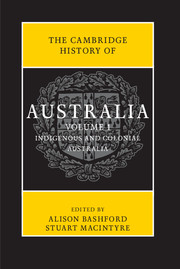Book contents
- Frontmatter
- Contents
- Abbreviations
- List of maps
- List of figures
- List of tables
- Notes on contributors
- Map
- Preface
- Introduction
- PART I
- 1 The past 50,000 years: an archaeological view
- 2 Newcomers, c. 1600–1800
- 3 Convict transportation in global context, c. 1700–88
- 4 The early colonial presence, 1788–1822
- 5 Expansion, 1820–50
- 6 The advent of self-government, 1840s–90
- 7 The gold rushes of the 1850s
- 8 Colonial states and civil society, 1860–90
- 9 Rethinking the 1890s
- 10 Making the federal Commonwealth, 1890–1901
- PART II
- Further reading
- Chronology
- Index
- Frontmatter
- Contents
- Abbreviations
- List of maps
- List of figures
- List of tables
- Notes on contributors
- Map
- Preface
- Introduction
- PART I
- PART II
- Further reading
- Chronology
- Index
3 - Convict transportation in global context, c. 1700–88
from PART I
Published online by Cambridge University Press: 05 November 2013
- Frontmatter
- Contents
- Abbreviations
- List of maps
- List of figures
- List of tables
- Notes on contributors
- Map
- Preface
- Introduction
- PART I
- 1 The past 50,000 years: an archaeological view
- 2 Newcomers, c. 1600–1800
- 3 Convict transportation in global context, c. 1700–88
- 4 The early colonial presence, 1788–1822
- 5 Expansion, 1820–50
- 6 The advent of self-government, 1840s–90
- 7 The gold rushes of the 1850s
- 8 Colonial states and civil society, 1860–90
- 9 Rethinking the 1890s
- 10 Making the federal Commonwealth, 1890–1901
- PART II
- Further reading
- Chronology
- Index
- Frontmatter
- Contents
- Abbreviations
- List of maps
- List of figures
- List of tables
- Notes on contributors
- Map
- Preface
- Introduction
- PART I
- PART II
- Further reading
- Chronology
- Index
Summary
On 18 January 1788 the Royal Navy's armed tender, Supply, sailed into a large estuarine inlet on the eastern seaboard of the continental mass of Australia. This was a place that British vessels had been to before. James Cook had visited in April 1770, naming it Sting Ray Harbour on account of the large number of fish of that species netted by the crew of the Endeavour. He later renamed the expanse of water Botany Bay – a reference to the haul of exotic plants garnered by Joseph Banks and Daniel Solander, the expedition's scientists. Yet it was the subsequent visit of the Supply that was to make Botany Bay a British household name. Over the following two days a collection of six blunt-nosed and round-bodied transport vessels slipped into the harbour, accompanied by three store ships and HMS Sirius. On board were officers, seamen and marines, plus 736 convicts. This ‘First Fleet’ was a harbinger of things to come. Over the next 80 years it would be followed by a further 800 transports that would deliver a total of 160,000 convicts to Britain's Australian colonies.
The announcement of the Botany Bay scheme in 1786 excited much comment in British newspapers. Many wanted to know more about the location and geography of the intended settlement. Was it closer to Cape Horn or the Cape of Good Hope, they asked. In an attempt to cash in on the public's curiosity, newspaper editors printed extracts from Cook's account of New Holland while others offered charts for sale. Enterprising quacks even hawked remedies for scurvy to officers about to embark. To many, the distances involved seemed astonishing. One correspondent reported sarcastically that his proposal to establish ‘a short Cut through the Centre of the Earth’ had induced enthusiastic responses from ‘several Royal Academies and Philosophical Societies’.
- Type
- Chapter
- Information
- The Cambridge History of Australia , pp. 68 - 90Publisher: Cambridge University PressPrint publication year: 2013
- 4
- Cited by



